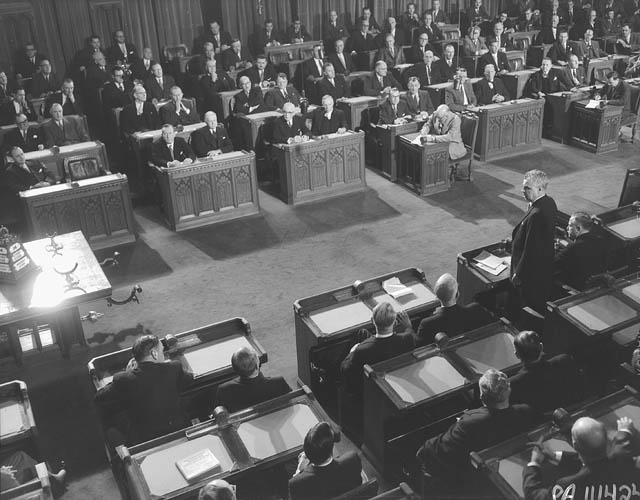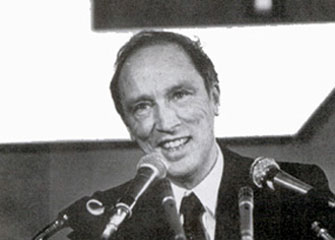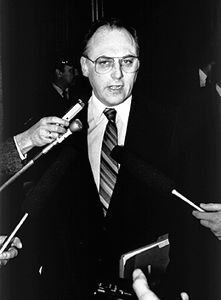Browse "Politics"
-
Macleans
Elections '97: The Platforms
Among political strategists, it is sometimes known as "the barbecue factor": the manner in which a once-hot candidate ends up cooked on election day. The principal example, one that many of Prime Minister Jean Chrétien's strategists recall with a shudder, is former Ontario Liberal leader Lyn McLeod.This article was originally published in Maclean's Magazine on May 26, 1997
"https://development.thecanadianencyclopedia.ca/images/tce_placeholder.jpg?v=e9dca980c9bdb3aa11e832e7ea94f5d9" // resources/views/front/categories/view.blade.php
https://development.thecanadianencyclopedia.ca/images/tce_placeholder.jpg?v=e9dca980c9bdb3aa11e832e7ea94f5d9
-
Article
Elections of 1925 and 1926
The following article is an editorial written by The Canadian Encyclopedia staff. Editorials are not usually updated.
"https://d2ttikhf7xbzbs.cloudfront.net/media/media/b82af0bf-c28c-4f44-be97-09df6c7f769a.jpg" // resources/views/front/categories/view.blade.php
https://d2ttikhf7xbzbs.cloudfront.net/media/media/b82af0bf-c28c-4f44-be97-09df6c7f769a.jpg
-
Article
Elections of 1957 and 1958
The following article is an editorial written by The Canadian Encyclopedia staff. Editorials are not usually updated.
"https://d2ttikhf7xbzbs.cloudfront.net/media/media/d024c85f-684d-4895-bde2-37d4f64620e5.jpg" // resources/views/front/categories/view.blade.php
https://d2ttikhf7xbzbs.cloudfront.net/media/media/d024c85f-684d-4895-bde2-37d4f64620e5.jpg
-
Article
Elections of 1979 and 1980
The following article is an editorial written by The Canadian Encyclopedia staff. Editorials are not usually updated. Calling elections is like Goldilocks visiting the three bears — which political stew will turn out to be too soon, too late, or just right? The elections of 1979 and 1980 illustrate the perils of too late, followed by too soon.
"https://d2ttikhf7xbzbs.cloudfront.net/media/media/94d33b59-7a6c-4ea2-9fb1-b4b57e3be842.jpg" // resources/views/front/categories/view.blade.php
https://d2ttikhf7xbzbs.cloudfront.net/media/media/94d33b59-7a6c-4ea2-9fb1-b4b57e3be842.jpg
-
Article
Enfranchisement (Plain-Language Summary)
Throughout much of Canadian history, a First Nations person would lose their Indian status if they were enfranchised. An enfranchised person is someone who has the right to vote in elections. A First Nations person who is deemed a Status Indian has certain rights and benefits granted to them through the Indian Act. (This article is a plain-language summary of Enfranchisement. If you are interested in reading about this topic in more depth, please see our full-length entry Enfranchisement).
"https://d2ttikhf7xbzbs.cloudfront.net/media/media/4d994481-dad0-4092-811e-1f0718cd1a1e.jpg" // resources/views/front/categories/view.blade.php
https://d2ttikhf7xbzbs.cloudfront.net/media/media/4d994481-dad0-4092-811e-1f0718cd1a1e.jpg
-
Editorial
The British Conquest of 1760
The following article is an editorial written by The Canadian Encyclopedia staff. Editorials are not usually updated.
"https://development.thecanadianencyclopedia.ca/images/tce_placeholder.jpg?v=e9dca980c9bdb3aa11e832e7ea94f5d9" // resources/views/front/categories/view.blade.php
https://development.thecanadianencyclopedia.ca/images/tce_placeholder.jpg?v=e9dca980c9bdb3aa11e832e7ea94f5d9
-
Editorial
Editorial: Newfoundland’s Contribution to the Patriation of the Constitution
The following article is an editorial written by The Canadian Encyclopedia staff. Editorials are not usually updated. In the decades since 1982, politicians and the media have recounted the same story about the patriation of Canada’s constitution and the adoption of the Charter of Rights and Freedoms. Most of the credit in this version goes to Prime Minister Pierre Trudeau. Three others are credited with breaking an impasse in the 1981 negotiations: federal justice minister Jean Chrétien, Saskatchewan attorney general Roy Romanow, and Ontario attorney general Roy McMurtry. But in his memoirs, former Newfoundland Premier Brian Peckford argues that the key intervention in the patriation process came from Peckford and the members of the Newfoundland delegation.
"https://d2ttikhf7xbzbs.cloudfront.net/media/media/0bc62d4c-deea-4509-8390-d8fa47d7c99a.jpg" // resources/views/front/categories/view.blade.php
https://d2ttikhf7xbzbs.cloudfront.net/media/media/0bc62d4c-deea-4509-8390-d8fa47d7c99a.jpg
-
Article
Gradual Civilization Act
An Act to Encourage the Gradual Civilization of the Indian Tribes in the Province was passed by the fifth Parliament of the Province of Canada in 1857. It is commonly known as The Gradual Civilization Act. The Act was part of an effort to assimilate Indigenous peoples. It promoted the adoption of economic and social customs of European settler society.
"https://d2ttikhf7xbzbs.cloudfront.net/media/media/a042133-v6.jpg" // resources/views/front/categories/view.blade.php
https://d2ttikhf7xbzbs.cloudfront.net/media/media/a042133-v6.jpg
-
Article
Great Coalition of 1864 (Plain-Language Summary)
In the early 1860s, politics in the Province of Canada were unstable and deadlocked. The Great Coalition of 1864 was a turning point in Canadian history. It broke the logjam and helped to create a new country. It united Reformers and Conservatives in the cause of constitutional reform. This paved the way for the Charlottetown Conference and Confederation. This article is a plain-language summary of the Great Coalition of 1864. If you would like to read about this topic in more depth, please see our full-length entry: Great Coalition of 1864.
"https://d2ttikhf7xbzbs.cloudfront.net/media/media/bf6a8447-8306-4749-bb63-2f6129eb20a6.jpg" // resources/views/front/categories/view.blade.php
https://d2ttikhf7xbzbs.cloudfront.net/media/media/bf6a8447-8306-4749-bb63-2f6129eb20a6.jpg
-
Article
Haldimand Proclamation
On 25 October 1784, Sir Frederick Haldimand, the governor of the province Quebec, signed a decree that granted a tract of land to the Haudenosaunee (Iroquois), also known as the Six Nations, in compensation for their alliance with British forces during the American Revolution (1775–83). This tract of land, known as the Haldimand Grant or Haldimand Tract, extended for 10 km on both sides of the Grand River (southwestern Ontario), from its source to Lake Erie. Throughout the late 1700s and 1800s, the Crown and Haudenosaunee disputed rights to the land title. Negotiations about title to the Haldimand Tract still continue between the Canadian government and the Six Nations Confederacy.
"https://d2ttikhf7xbzbs.cloudfront.net/media/media/4e9bdb40-6a17-4aed-8166-559a7b871ae7.jpg" // resources/views/front/categories/view.blade.php
https://d2ttikhf7xbzbs.cloudfront.net/media/media/4e9bdb40-6a17-4aed-8166-559a7b871ae7.jpg
-
Article
History Since Confederation
The story of Canada since 1867 is, in many ways, a successful one: For a century and a half, people of different languages, cultures and backgrounds, thrown together in the vast, northern reaches of a continent, built a free society where regional communities could grow and prosper, linked by the common thread of an emerging national identity. There were false steps along the way, including the struggles of Indigenous people for survival, and the ever-present tensions over federal unity. But for the most part, Canada became an example to the world of a modern, workable nation state.
"https://d2ttikhf7xbzbs.cloudfront.net/media/media/f8f2bab3-d387-4165-9fbc-617c30019b95.jpg" // resources/views/front/categories/view.blade.php
https://d2ttikhf7xbzbs.cloudfront.net/media/media/f8f2bab3-d387-4165-9fbc-617c30019b95.jpg
-
Article
Imperialism
Support for the British Empire and imperialism was strong in much of Canada in the decades after Confederation. But gradually, imperialist loyalties declined and Canadians demanded and won full autonomy within the empire.
"https://d2ttikhf7xbzbs.cloudfront.net/media/media/1558a81b-d087-438f-bb69-6c19774bd62a.jpg" // resources/views/front/categories/view.blade.php
https://d2ttikhf7xbzbs.cloudfront.net/media/media/1558a81b-d087-438f-bb69-6c19774bd62a.jpg
-
Article
La Presse Strike
Two days later, the 3 main UNION CENTRALS defied a municipal ban to organize a huge march in solidarity with the newspaper workers. More than 12 000 people clashed with 100 Montréal policemen. The outcome was some 50 arrests, several dozen injuries and one death from natural causes.
"https://d2ttikhf7xbzbs.cloudfront.net/media/media/c762eef7-88b7-40c9-afbe-91aa60ae56dd.jpg" // resources/views/front/categories/view.blade.php
https://d2ttikhf7xbzbs.cloudfront.net/media/media/c762eef7-88b7-40c9-afbe-91aa60ae56dd.jpg
-
Article
Labour Organization
The first labour organizations in Canada appeared in the early 19th century, but their growth and development really occurred in the early decades of the 20th century. During most of the 19th century labour unions were local, sporadic and short-lived.
"https://development.thecanadianencyclopedia.ca/images/tce_placeholder.jpg?v=e9dca980c9bdb3aa11e832e7ea94f5d9" // resources/views/front/categories/view.blade.php
https://development.thecanadianencyclopedia.ca/images/tce_placeholder.jpg?v=e9dca980c9bdb3aa11e832e7ea94f5d9
-
Article
League for Social Reconstruction
League for Social Reconstruction, organization of left-wing intellectuals, founded 1931-32 in Montréal and Toronto, largely in response to the GREAT DEPRESSION.
"https://development.thecanadianencyclopedia.ca/images/tce_placeholder.jpg?v=e9dca980c9bdb3aa11e832e7ea94f5d9" // resources/views/front/categories/view.blade.php
https://development.thecanadianencyclopedia.ca/images/tce_placeholder.jpg?v=e9dca980c9bdb3aa11e832e7ea94f5d9
